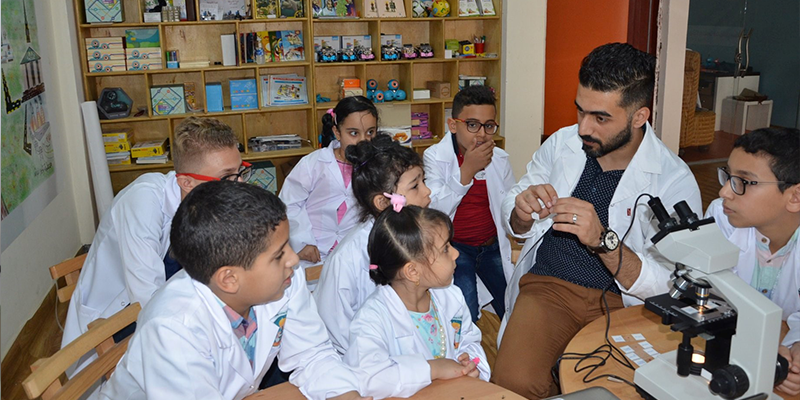
Ammar Al-Attar, 2014 Fulbright Alum from Iraq
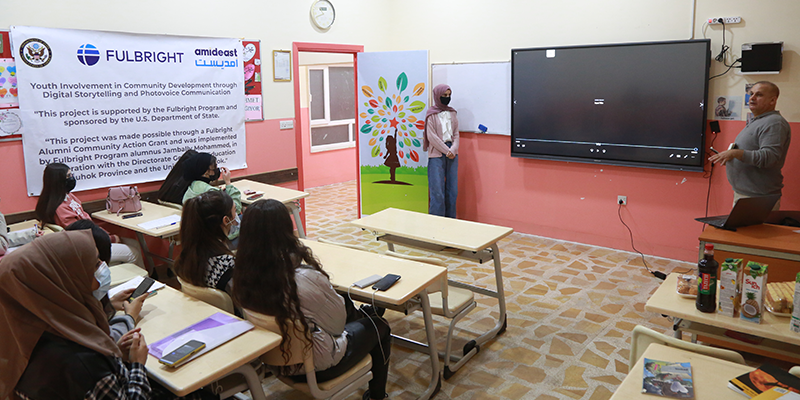
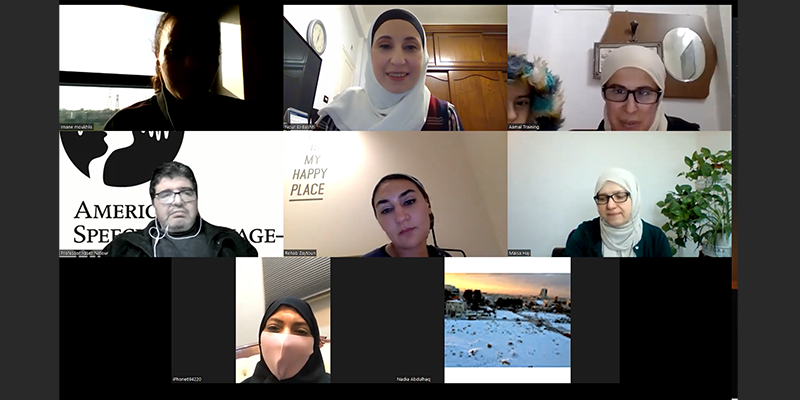
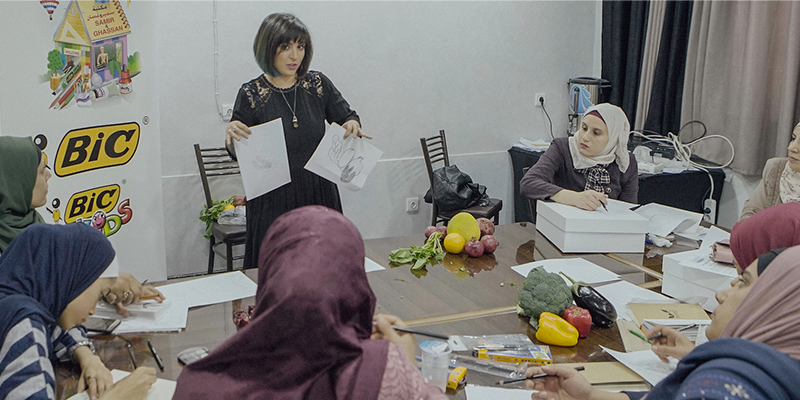
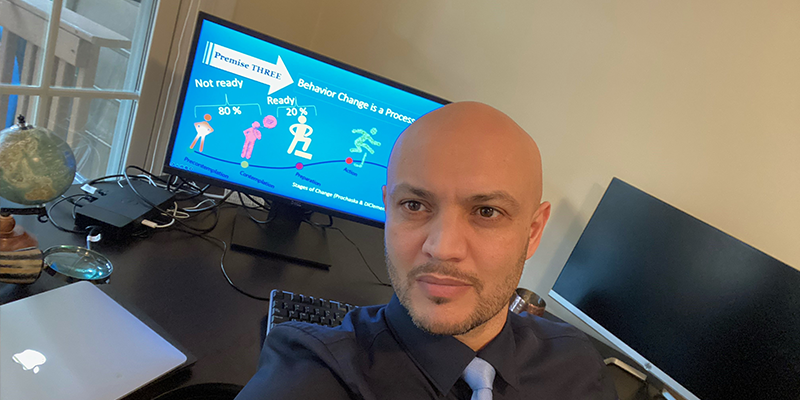
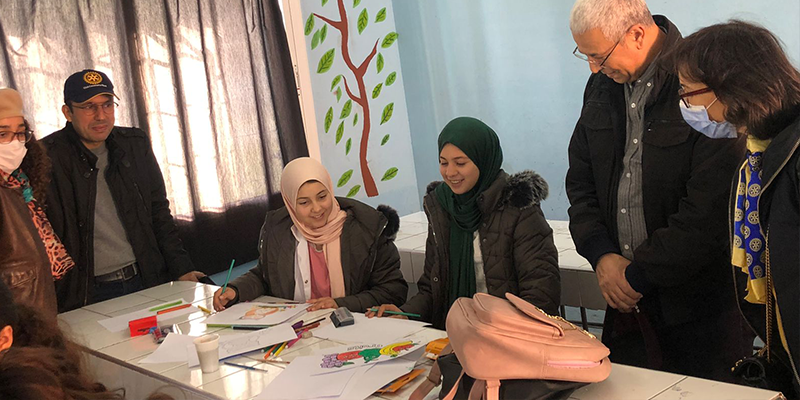
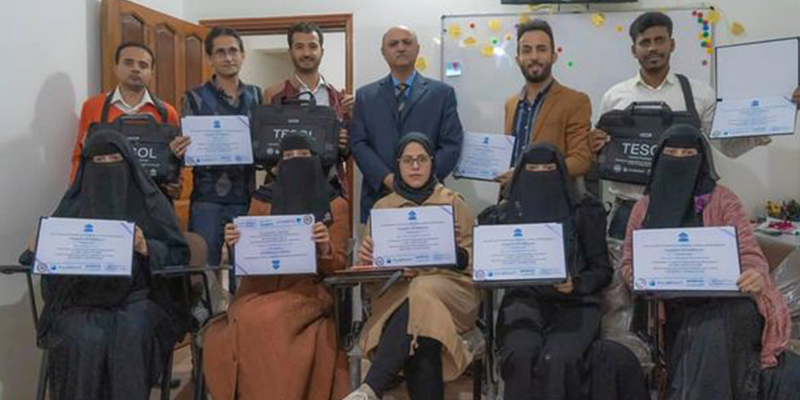
In 2021, to mark the 75th Anniversary of the Fulbright Program, Amideast announced a special edition of the ACAG program. Seven past ACAG recipients from Iraq, Jordan, Libya, Morocco, and Yemen were selected to implement a new round of ACAG projects in diverse areas such as public health, STEM education, community planning, English language teaching, and creative expression through the arts – with a focus on providing this enrichment to underserved communities.
These alumni were chosen for their ability to make a lasting impact in the MENA region through their unique initiatives that exemplify the spirit of the Fulbright Program. Community service and volunteering have always been a strong pillar of the Fulbright Program, and each alum was selected based on their continued commitment to be leaders and changemakers. The selected alumni and their projects include:
Ammar Al-Attar, 2014, Iraq, New York Medical College, MS Physiology
Ammar Al-Attar continued to build on his “Anunnaki Science and Youth Club” initiative, which teaches the fundamentals of robotics, coding, and biology to children in Basrah, Iraq, since he created it using an ACAG grant in 2018. By using engaging and innovative learning methods in the sciences, he hopes to inspire Iraqi youth to pursue careers in computer science and biomedical research.
Al-Attar relates, “I chose this project to leave a positive impact on our community and make technology a source of knowledge and character-building for children rather than only using it as a source to keep up with trends and social activities through social media. I want the kids to love science and get involved in science for the sake of science, not just for good grades and fancy certificates to hang on the wall or present in a CV.”
He adds, “I studied physiology, biology, and chemistry courses during my master's degree, exploring how the human body and cells work. I would like to pass on this knowledge to the kids to expand their imagination to unknown territories. This is completely different to teaching grown-ups who have already been programmed to learn just enough to pass a test. Showing science to kids outside of the context of classic schooling is essential for the future of education in our country and the world.”
Jambally Mohamed, 2011, Iraq, Texas Tech University, MS Community Planning
Jambally Mohamed selected a group of 30 students from diverse geographic and socioeconomic backgrounds to help public service officials identify local areas in need of development and propose how to improve them. The students will receive training in digital storytelling and photovoice communication techniques to enable them to present their ideas at local school exhibitions and communicate their ideas with local leaders.
Mohamed’s project uses the principles of community planning and development that he studied during his Fulbright Program and implemented through three previous ACAGs to map the ruins of the Akre Citadel, record local stories about its history, and teach children the fundamentals of urban planning.
Voicing his confidence in the impact of his latest grant, Mohamed says, “Digital storytelling and photovoice communications are the best methods to facilitate the delivery of young peoples’ concerns, perspectives, and ideas to the decision-makers in their communities. I hope that the students will further benefit from their experience participating in the project and use what they have learned in their future careers. It is also my biggest hope to convey the students’ concerns and ideas about their communities to the relevant local public departments.”
Nour El-Bashiti, 2008, Jordan, University of Florida, PhD Speech Language Pathology
After completing her doctorate in speech language pathology as a Fulbright grantee, Nour El-Bashiti returned home to Jordan, where she was one of only a few specialists in her area of expertise: – cleft lips and palates. Moreover, as the only one with a Ph.D., she felt “a great deal of responsibility … to train others and spread the skills and knowledge I acquired through my studies with Fulbright.” Three years later, she used an ACAG grant to expand her work to bring her training series to Morocco. Now, with her latest ACAG, she is developing a website in both Arabic and English that will serve as an online platform for speech language pathologists in the Middle East and North Africa region to connect with each other, exchange ideas and information about disorders and intervention techniques, and discover courses and workshops offered by specialists in the field. Her website will also allow parents and caregivers of children with communication disorders to use the site as a resource to provide support and information.
El-Bashiti notes, “Fulbright's number one goal was always to provide remarkable educational opportunities and connect people from different parts of the world. This project aligns with that goal since it allows professionals from different parts of the region to interact and learn from each other. I see this project as a tool to reflect on my experience during the years of my Fulbright Program and to influence young professionals to help them reach their goals.”
Rand Abdul Nour, 2013, Jordan, Pennsylvania Academy of Fine Arts, MFA Painting and Drawing
Rand Abdul Nour started “The Box” project, an initiative that provides art kits for women—particularly mothers, female teachers, and young women—for whom art education is not always a priority. She has also created an online platform that connects women to one another for artistic collaboration and enables them to promote their work on social media. Finally, “The Box” hosts a series of workshops across Jordan to help communities break down barriers to freely expressing themselves through art.
“Since The Box is an adaptable tool that can be used by beginners of virtually any age, we will be empowering mothers with a tool that would allow them to find their own artistic voice and to steer their children’s energies towards creation and problem-solving. We have been working with multiple local women’s rights organizations that have been able to host us and connect us to participants,” notes Abdul Nour, who sees an important role for artists and arts educators in children’s and community development.
“As artists and art educators ourselves, we are equipped with a strong set of skills that allows us to help our students to let go of any psychological, economic, or skill level inhibitions that stand in the way of them making art.”
“Few districts in Jordan realize the scientifically-demonstrated benefits of art education, which include the active engagement of various areas of the brain and the development of social skills that promote cohesion. The arts can also stimulate creative thinking and problem-solving, which translates to a greater proclivity for innovation and leadership. Through this project, we have been successful in normalizing art and having it become an integral part of communal development, therefore indirectly supporting national efforts to modernize and redefine approaches to education.”
Hosam Alraqiq, 2007, Libya, Boston University, MSD Dental Public Health
Furthering the success of his 2019 ACAG to improve oral health assessments of children in Tripoli, Libya, Hosam Alraqiq’s project aims to improve children’s oral health by providing parents/caregivers, communities, and health officials information on pressing oral health issues. By working with both dentists and parents, his project seeks to re-engage dentists from community health centers in preventive procedures while also raising parental awareness about the value of regular dental care.
Alraqiq’s project builds on his first ACAG project, which he says “was instrumental in building capacity within the community health center system in Tripoli by training dentists on proper dental screening techniques and assessing the dental needs of the children population. In particular, most of the screened children in our sample have untreated tooth decay, are not engaged in healthy behaviors, and see the dentist only when having dental problems. In addition, most Libyan dentists are focused on tooth repair because of their prior traditional and primary clinical training. They lack the interpersonal skills to engage patients and their families in positive behavior change. Therefore, public health actions targeting individual behaviors, societal norms, and healthcare system factors are necessary to address those issues effectively.”
Bouzekri Touri, 2015, Morocco, University of Texas at Austin, PhD School Psychology & Communication Disorders
Furthering his 2018 ACAG grant, Bouzekri Touri is currently working with educators in Morocco’s 12 national regions on a project that aims to reduce school drop-out rates of students with learning disabilities. Using the skills he learned on his Fulbright Program, his project trains teachers in techniques to identify children with disabilities, with a special focus on rural schools. His project will also host workshops for parents on how to detect and care for children with learning disabilities and communications disorders and seek appropriate therapy in nearby public hospitals.
Touri’s project addresses a critical need, as he notes: “During our previous diagnosis sessions, we were overwhelmed with the various cases we received in primary schools. Parents are complaining of ignorance about their kids’ learning issues and lack of infrastructures for diagnosis, care, and follow-up. Therapy sessions are costly. Teachers have said they have no idea how to detect learning or communication disorders and school directors lack resources to hire specialized therapists. We think that our health school caravan is very successful and deserves to be shared with other schools in four distant regions of Morocco where speech therapists and school psychologists are non-existent.”
Abdullah Al Ghurbani, 2003, Yemen, Southern Illinois University- Carbondale, MSED Educational Administration
In October of 2021, Abdullah Al Ghurbani created a training program for fifty Yemeni English language teachers on the latest methods of TESOL (Teaching English to Speakers of Other Languages). His projects aim to enable these teachers to reach their full potential as English language educators – a goal that helps address the acute need for qualified English teachers in Yemen. Expanding access to English language education in turn supports the expansion of educational and professional opportunities for Yemeni youth.
Al Ghurbani notes, “There is a high demand for learning English in Yemen, but most English language teachers do not have opportunities for training, especially since the war started. After this course, these trainees will be excellent teachers ready to help their English language learners. The direct beneficiaries are fifty teachers, but this training will indirectly benefit hundreds of students who will get a better education and will have a better chance of obtaining a higher education or profession.”
